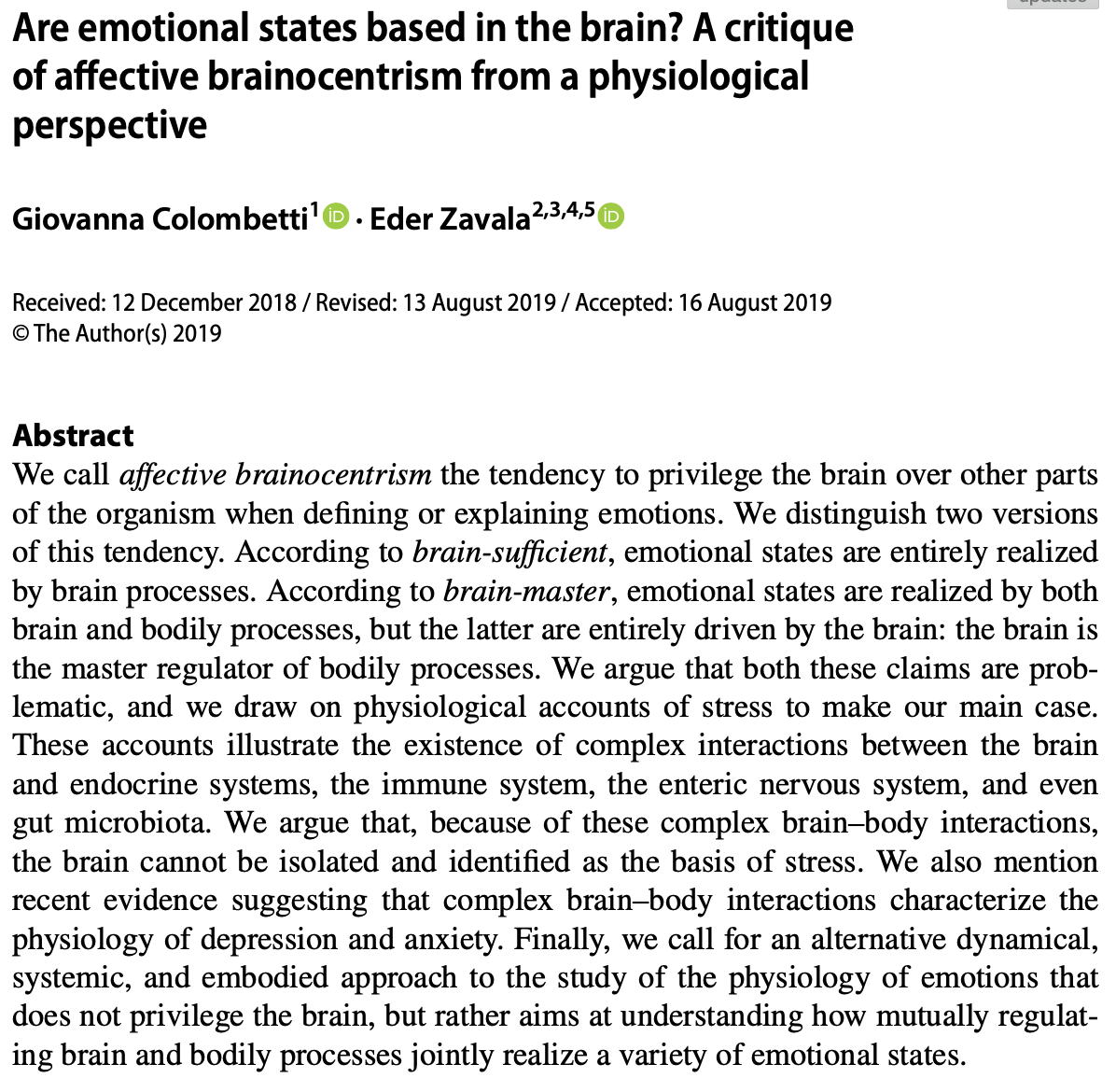
Interesting paper from Giovanna Colombetti and Eder Zavala from the University of Exeter. Abstract and selected excerpts below to give you a sense of where the authors are coming from. The full paper can be read online here

“Despite [the] trend toward regarding bodily changes as important components of emotions, it is often claimed that the brain is the basis or substrate of emotions; or, equivalently, that emotions are based in the brain. What exactly this means is generally left unexplained. It is clear, however, that this claim goes together with the tendency to privilege the brain over other physiological processes when defining or explaining emotions. We call this tendency affective brainocentrism“…
“We think that affective brainocentrism is problematic and our goal in this paper is to explain why. Our main claim is that interactions between brain and body (understood broadly to encompass commensal microorganisms) are too complex to warrant isolating and identifying brain processes as the basis of emotional states. Relatedly, bodily processes are not mere contingent accompaniments, or outputs, of such states. They are proper realizers of emotional states, together with brain processes. In other words, emotional states are physically realized by mutually regulating brain and bodily processes”…
“In sum, we have argued that affective brainocentrism is problematic by showing that it is not compatible with current physiological accounts of at least some emotional states or conditions. Evidence from physiology shows that when an individual is stressed, depressed, or anxious, these conditions are sustained through complex interactions between brain and bodily processes. This complex interactivity undermines both the claim that the brain is the sole realizer of those conditions, and that it is their locus of control or master regulator. It also undermines the methodological assumption that studying the brain only can provide adequate and complete explanations of those emotional conditions”…
“…one might wonder why brainocentrism persists in affective science, given that the integration of brain and body is old news in biology and neuroscientists are also well aware of it. It is indeed interesting that some researchers, as we have seen, make brainocentric claims even when they explicitly note that brain and body are complexly interrelated. Awareness of the deep interconnectedness of brain and body has not led to abandoning the assumption that the brain can somehow be unplugged from the rest of the organism and take on the role of sole realizer, or master regulator, of emotional states.”…
“This proposal amounts, in effect, to an invitation to adopt a dynamical, systemic, and embodied approach to the study of the physiology of emotional states. Taking such an approach means looking at how physiological processes in both brain and body unfold and change over time, and influence one another; and at how their mutual influences over time make a difference to the individual’s emotional condition.” (emphasis added)
It’s a very accessible paper, well written and well argued. Worth reading and reflecting on whether there are parallels of brainocentrism in our and your domains of interest and work.
I’d just take it a step (or three) further and round out a few more Es – to Embodied, I’d add Extended, Embedded and Enacted in line with the increasingly influential idea of ‘4E Cognition’ (although not just cognition, but perception, action and more generally being) in adopting a dynamical and systems approach. These additions bring in the world (into which we Extend, bring forth through our perception and action – Enact, and in which we are Embedded) in line with Merlaeu-Ponty’s notion of the world:
“The body is our general medium for having a world… The world and I are within one another.”
Feel free to sound off below, if you should so choose, but read the whole paper first!
-Tim Cocks
Click the image to head over to noigroup.com to check out our 2020 courses!


Thanks Tim for posting and commenting on this article. Clinical practice can only be enriched by adopting the holism of 4E. 4E has been resisting various forms of neuro-nihilism for 20+ years, and embodied/enactive accounts, particularly radically embodied cognition (REC) is muscling up to the representationalism implicit in free energy and active inference based accounts of perception and action. For those interested in the intellectual provenance of embodied cognition I strongly suggest starting with:
The Embodied Mind Cognitive Science and Human Experience
revised edition
Francisco J. Varela, Evan Thompson & Eleanor Rosch